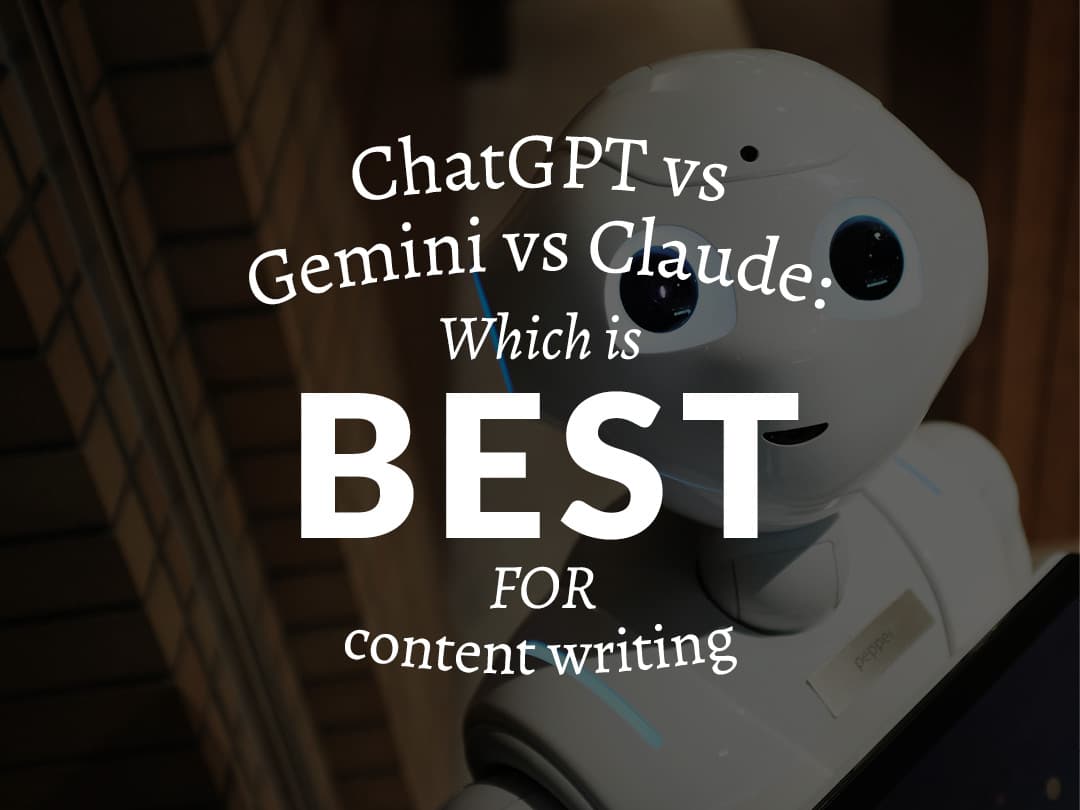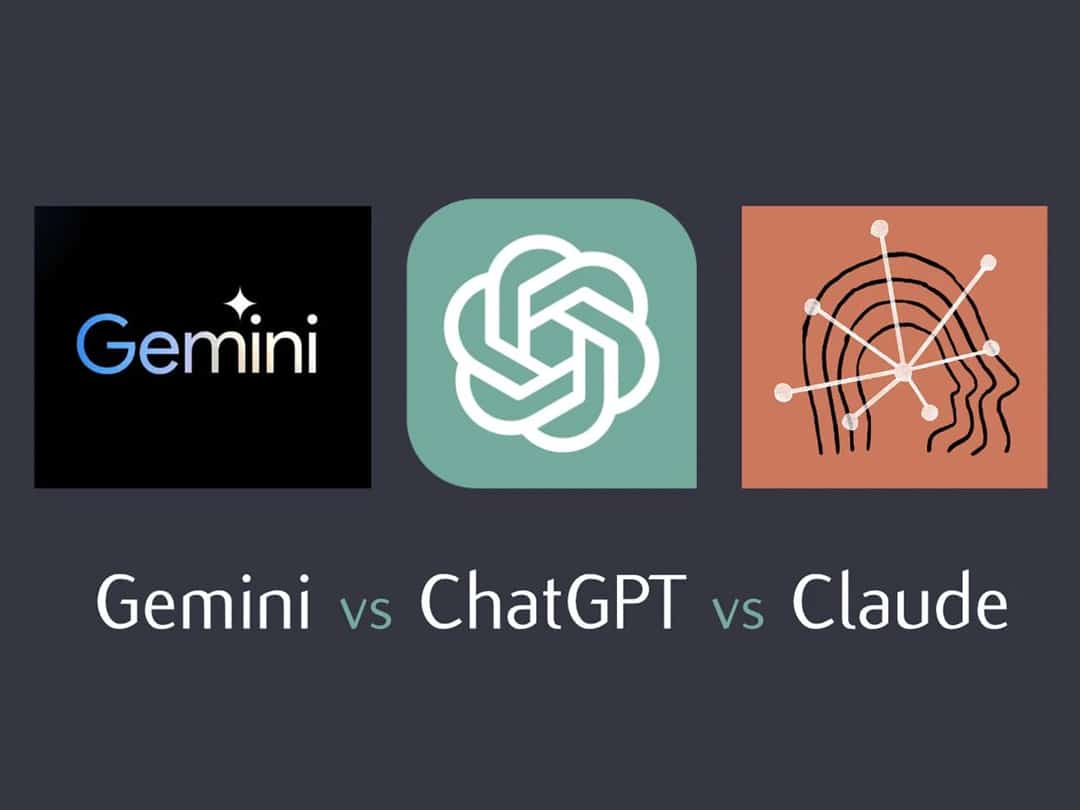ChatGPT vs Gemini vs Claude: Which is the best for content writing
In the dynamic world of content creation, where everyone’s looking to get ahead, we find ourselves at a crossroads, debating between ChatGPT vs Gemini vs Claude. Which formidable AI will emerge as the champion of content writing? This clash of titans isn’t just about who can write faster or smarter; it’s about understanding the nuances that make each tool unique and indispensable. For those of us diving into the depths of digital content creation, choosing the right AI assistant isn’t just a matter of convenience, it’s a strategic decision that could shape the future of our projects and influence our success in the sprawling expanse of the World Wide Web.
Let’s peel back the layers of what makes ChatGPT, Gemini, and Claude stand out in the realm of content writing. I’ll walk you through an overview of each tool, highlighting their strengths and identifying their quirks. Then, we will dive deeper into the rabbit hole with a detailed comparison – ChatGpt vs Gemini, ChatGPT vs Claude, and of course, Gemini vs Claude – to see how artificial intelligence stacks up against one another in the gritty details of performance, creativity, and ease of use. Whether you’re a seasoned content creator, a curious newcomer, or somewhere gleefully in-between, our exploration will arm you with the knowledge to make an informed choice on which AI companion will best suit your writing adventures.
Overview of ChatGPT for Content Writing
Key Features
Possibly the most noteworthy of the language models, ChatGPT stands as a cutting-edge artificial intelligence (AI) language model designed to process and analyse massive amounts of text data, generating human-like text responses. First released in 2022 by OpenAI, its capabilities extend to conducting research and generating new ideas and outlines swiftly, offering suggestions that can be pivotal for content creation. However, it is important to note that ChatGPT is not inherently designed to produce content optimised for search engines. This means that users must integrate keywords manually for on-page SEO, and detailed writing prompts are necessary to steer the content towards specific requirements.
Strengths and Weaknesses
One of the key strengths of ChatGPT is its speed and efficiency in generating content, which is particularly useful for short-form content such as ads, landing page copy, and social media posts. Additionally, tools like Surfer’s Humaniser can be employed to enhance the AI-generated content, making it sound more natural and engaging while ensuring it passes AI detection tools used by search engines. To this end, ChatGPT is a perfectly capable model for creating content for SEO, when used by experienced SEO experts in conjunction with traditional SEO principles you can see real improvements in online traffic.
On the downside, ChatGPT may generate repetitive ideas and phrases and the content might not always be accurate or appropriate due to its training data being limited to information published up to specific dates. There have been the odd calamity caused by ChatGPT responses and that necessitates a thorough review of the content to ensure its quality and accuracy before publishing. Furthermore, ChatGPT’s lack of creativity and uniqueness can be a significant limitation, especially when the content demands a ‘human touch’.
User Experiences
Users have found ChatGPT to be an invaluable tool for tasks such as brainstorming, crafting first drafts, and even improving grammar. It has been particularly praised for its role in reducing the mundane aspects of writing and providing assistance with language generation for customer service and personalised content. However, experiences vary when it comes to more creative tasks such as story writing or generating content that accurately reflects a brand’s unique voice and style.
In practice, while ChatGPT can save time and effort in drafting and basic content creation, it often requires additional input and refinement to meet higher standards of creativity and brand-specific nuances. Users need to provide detailed outlines and constant feedback to guide the AI in generating usable content that aligns with their objectives.
In summary, while ChatGPT offers numerous advantages in terms of efficiency and basic content generation, it does have limitations that require human oversight and intervention to produce content that is not only engaging but also accurate and brand-aligned.
Overview of Gemini for Content Writing
Key Features
Gemini, developed by Google, is designed to enhance content creation with its advanced AI capabilities. It offers a user-friendly interface that simplifies the content generation process. Unlike CHatGPT users can benefit from features like multiple draft versions, which allow for selecting the most suitable content style and tone. Additionally, the ability to adjust the length and complexity of the output is particularly useful, catering to various content needs, whether for a more straightforward or a professional tone.
Strengths and Weaknesses
One of Gemini’s significant strengths is its ability to generate longer pieces of content efficiently. For instance, with the “Longer” feature, users can produce up to 800 words from a single prompt, which is notably more than what other similar tools can achieve. This makes Gemini an AI model that is particularly valuable for creating more extensive blog posts or articles without needing to input prompts repeatedly.
Google’s Gemini is reported to be the best of the ‘big three’ for image analysis, as its proficient at analysing multimedia content.
However, Gemini is not without its limitations. The tool does not offer an extensive editing history, which can hinder the revision process as only the most recent prompts can be revised. Additionally, once a draft is selected and edited, other draft options are no longer available for review, which might restrict flexibility in content creation. As with all other AI’s there have been teething issues, particularly this infamous error by the image generator.
User Experiences
Users have reported that Gemini’s integration with Google Workspace significantly enhances workflow efficiency, allowing for direct exports to Google Docs or emails via Gmail. This seamless integration is highly appreciated for its convenience and ability to streamline the content creation process.
Despite its many benefits, Gemini requires a good understanding of prompt engineering to fully leverage its capabilities. It is best suited for those who are already confident in using AI tools. For beginners, the lack of templates and guided features might present a steeper learning curve. However, the base version of Gemini is free, which provides an excellent opportunity for users to practice and improve their skills in AI-driven content creation.
In summary, Gemini offers a robust set of features that can significantly aid in the content writing process, though it does come with some limitations that require consideration. Its ability to produce longer content efficiently and its seamless integration with Google services make it a strong contender in the realm of AI writing tools.
Overview of Claude for Content Writing
Key Features
Claude, developed by Anthropic, presents a robust suite of features tailored for enhancing content creation. Key among these is its expansive context window, which allows it to process and generate responses based on inputs as long as 75,000 words or 100,000 tokens. This capability is particularly beneficial for handling large documents or extended narratives without losing coherence. Additionally, Claude is designed to be highly expressive and creative, capable of mimicking a wide range of writing styles, which makes it an excellent tool for tasks requiring a distinct voice, such as creative writing or branded content.
Strengths and Weaknesses
Claude’s strengths lie in its creativity and the ability to produce content that resonates with human emotions, making it ideal for writing dialogues or any content where style and voice are crucial. However, while Claude excels in creative tasks, it may falter in more complex reasoning tasks or in following highly detailed instructions. Its expressive nature sometimes leads to outputs that, although interesting, may deviate from the original instructions provided by the user. This characteristic necessitates a careful review and possible reiterations to align the output closely with specific content goals. Both Claude and ChatGPT are strong at answering queries and generating content, whereas Gemini might be ahead in terms of complex reasoning.
Claude AI tends to do very well against certain benchmarks and does a better job particularly with code and math problems. Claude is very much left in the dark when it comes to image generation as it doesn’t offer this at all, only image analysis. Gemini would have the clear advantage here. If your brainstorming ideas then Claude is strong with these types of prompts especially as you develop your ability to test the application.
The free version of Claude AI is trained on the latest data, August 2023, as opposed to Gemini and ChatGPT whose free versions are trained on earlier data sets. If you’re interested in using free versions this might swing your vote, otherwise the other strengths may be more valuable to you.
User Experiences
Users have reported positive experiences with Claude, especially when crafting natural-sounding copy for various applications such as landing pages, email sequences, and social media posts. The ability to upload large documents enhances Claude’s understanding and output, making it a preferred choice for projects requiring substantial contextual depth. However, some limitations are noted in its interaction model, particularly the lack of an editing feature for prompts and the necessity to remind the system of specific instructions during iterative content development. Despite these challenges, Claude’s integration into content creation workflows, especially for copywriting tasks, is highly valued.
In summary, Claude’s advanced capabilities make it a powerful tool in the arsenal of content creators, offering a blend of creative flexibility and extensive document handling that is unmatched by many other AI models. Its unique features and user experiences highlight its potential to significantly impact the content creation process, although attention must be given to its limitations to fully leverage its strengths.
Detailed Comparison: ChatGPT vs Gemini vs Claude
Performance and Quality
When comparing the performance and quality of ChatGPT, Gemini, and Claude, each AI showcases distinct capabilities and strengths. ChatGPT is praised for its low rate of AI hallucinations and its ability to correct itself upon user feedback, which enhances its reliability for generating accurate content. Gemini, on the other hand, offers real-time internet connectivity, providing answers to current events with more accuracy compared to its predecessors, though it still requires careful consideration of the information it generates. All three are strong with direct answer based questioning, it is worth double checking that you have a correct answers as they have been known to provide erroneous responses from time-to-time. Gemini also has the advantage over Claude on image creation by offering image generation as part of its skillset. ChatGPT has comparative benefits with improved image generation although it does struggle with 2D representation. Claude has shown significant improvements in its latest iteration, Claude 3 Opus, particularly in summarising large amounts of data with greater accuracy than both ChatGPT 3.5 and Gemini. This makes Claude a strong competitor, especially in tasks requiring detailed data analysis. It also appears that Claude has a greater volume of unique responses to its competitors.
Ease of Use
In terms of usability, each tool offers different advantages. ChatGPT, while efficient, often requires users to provide detailed prompts to produce the desired output, which can be a slight drawback for users seeking quick answers. Gemini’s user interface is connected to the internet, allowing for dynamic interactions with current data, which is a significant advantage for users needing up-to-date information. Claude, although not internet-connected, has improved its user interface in the latest version, making it more user-friendly for coding assistance and data summarisation tasks.
Pricing
Pricing is a critical factor in choosing the right AI tool. ChatGPT offers various models with costs ranging depending on the usage and specific features required. Gemini, initially free for basic use, might see a price adjustment as it becomes fully operational, which is important for budget-conscious users. Claude’s pricing details are less clear, but it is expected to be competitive with other models, offering different tiers based on the features and performance levels needed by the user.
Best Use Cases
Each AI model excels in different scenarios. ChatGPT is ideal for tasks that require quick generation of content like drafting emails or generating reports where speed is prioritised over creative depth. Gemini is best suited for scenarios where integration with Google’s suite of products can enhance the content creation process, such as drafting documents directly in Google Docs or integrating data from Google Sheets. Claude is particularly effective in creative writing and tasks requiring a nuanced understanding of text, making it suitable for content creators who need to maintain a unique voice or style. Workflow automation has also become a battlefield for each AI, Claude has been shown to do particularly well at understanding the workflow principles and addressing inefficiencies to provide streamlined processes.
In conclusion, the choice between ChatGPT, Gemini, and Claude depends largely on the specific needs of the user, including the type of content required, the importance of data accuracy, usability preferences, budget constraints, and the need for internet connectivity. Each tool has its strengths and areas for improvement, which should be carefully considered to select the best AI assistant for content writing tasks.
Conclusion
Throughout this exploration, we delved deeply into the capabilities and distinct edge each AI content writing tool – ChatGPT, Gemini, and Claude – brings to the broad spectrum of digital content creation. By meticulously breaking down their strengths, weaknesses, user experiences, and ideal use cases, it’s clear that the decision between them depends significantly on specific writing needs, the desired creativity level, and how these tools align with individual or organisational content goals. Such insights underscore the importance of choosing an AI partner that not only enhances the efficiency of content creation but also complements the creator’s voice and objectives.
If you are looking to create images then you would take advantage of ChatGPT and Gemini which have clear benefits to Claude due to its inability to generate images. All three offer quality in terms of image analysis, although ChatGPT seems to have ironed out more of its erroneous responses. For complex problems Gemini might just have the edge due to its integrated functionality, although Claude is ease-of-use and intuitiveness make it a competitor. For creative writing, marketing plans and writing structures Claude seems to provide logical reasoning and it’s iterative processing makes this feel like a symbiosis of intellects.
Ultimately, the continuous evolution of AI in the domain of content writing promises an exciting future for content creators. Whether the priority is speed, accuracy, creative flair, or seamless integration with existing digital workflows, ChatGPT, Gemini, and Claude each present compelling arguments for their adoption.
And Finally…
Our advice would be to test and utilise all three to find what works best for you over time, especially before you decide to spend money on using one of the professional paid versions. They all have varying degrees of quality based on rigorous AI benchmarks and language processing, you also have to factor in your learning curve and how familiar you become with the functions of the AI. In making a choice, it becomes crucial to weigh these factors carefully against one’s unique requirements. As the landscape of digital content creation expands, staying informed and adaptable will ensure that content creators can harness the full potential of these AI tools to craft compelling, relevant, and engaging content.
If you are looking to increase traffic to your website, improve online sales or click-throughs then our SEO experts can help. Our experience of working with generative AI models to create exciting content and apply what we know about SEO is our strong suit, we are able to produce compelling, beautifully designed website pages that work. Find out more…




